Sometimes I wonder. What was the need to pluck the flower, dissect it, analyse it, study it, and worst of all try to recreate it? Wasn’t seeing it, touching it and enjoying the scent enough? Why couldn’t I just be satisfied by listening to music? What was the need of trying to learn, sing, practice and perform? Life would have been much easier. Just listen to a song you like, hum it and get back to work like a lot of people.
It cannot be so simple. Why would I do it if I had a choice? Obviously, some kind of compulsion drives me. When a beat enthrals, a melody enchants, and music hijacks my awareness, I can’t just let it go. I can’t forget the song and get back to my world. And I am sure there are many more like me. There is something more to music. The world cannot be so simple. There has to be some magic to it. That’s what music means to me. It is a little bit of magic in an otherwise ordinary life. It is what brings meaning and desire to my mundane world. For me, music is what makes life worth living.
Unfinished Cadence 9: KM Day or Exams?
‘Unfinished cadence’ is a memoir about the fascinating experience I had as an Art student. From July 2016 to May 2017, I did a Foundation course in Western Music at KM College of Music & Technology.
Link to the previous part (part VII) can be found below:
KM Music Conservatory is a complete music school. It not only educates students about music performance, technical and academic aspects of music but also about marketing and commercial aspects of music. So our last assignment in academic skills was to seek sponsorship for each of our concert performances. It was sort of role-playing with John posing as the sponsor whom we were supposed to pitch to. He could be anyone – the owner of a sound company, music producer, sound label etc. Everyone came up with the usual ideas – a poster for the sponsor at the venue, how they would profit by supporting a budding artist, using their equipment for the sponsor etc.
I decided to use my medical background to my advantage. I not only promised my sponsor (a corporate sound company like Bose or JBL) a stall at the venue but also a free medical check-up for their employees in the medical college in Pondicherry. John appreciated the different angle and my resourcefulness but he raised concerns about the aseptic precautions at that hospital and the vicarious liability in case of a hospital-acquired infection.
Music school certainly improved my IT skills. One of the assignments was to design a poster for the aforementioned fictitious concert. Around 2017, smartphone apps were not that advanced; one had to download the software on a laptop/mac. So I downloaded a crack version of Adobe Photoshop and went to work. I also made a short video trailer of my performances. The poster and trailer were included in my presentation to the fictitious sponsor.
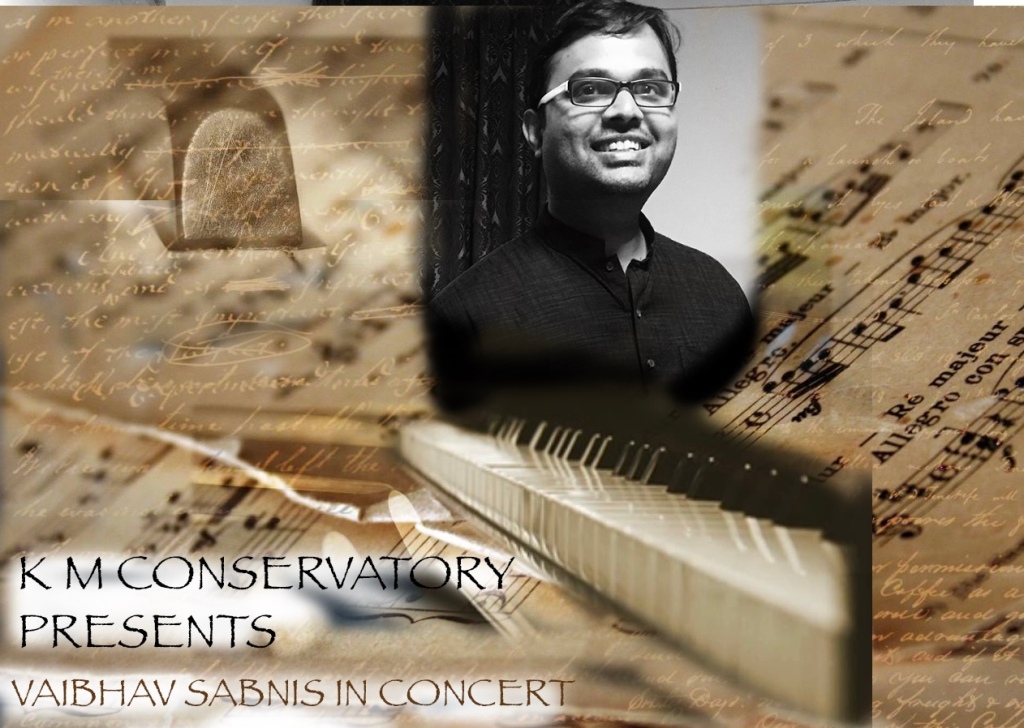
There was an interesting assignment in the Hindustani Classical Module. We had to make a presentation on any Hindustani musical instrument or an Indian musical genre. I decided to fall back on my roots and chose Marathi Natyasangeet. It is a type of musical play in the Marathi language where the premises, characters and plot are established and propelled through music. It drew heavily from Hindustani Classical music and singing those compositions required a high level of skill and proficiency. I found it extremely fascinating to study the historical background of Marathi Natyasangeet and the work of its chief proponents like Narayan Rajhans (alias Bal Gandharva), Deenanath Mangeshkar, Vasantrao Deshpande, Krushanji Khadilkar etc.
Meanwhile, group practice for the Opera Scenes had begun. I realized I had a few more parts to prepare in the second and third acts, a few solo lines in group songs, a part of another trio, a part of the chorus and an acting scene too. It seemed although Frank was a side character, it was a fairly meaty role. In the third act, I was supposed to do a spit-take with the protagonist, where I am drinking water and a sudden revelation by the protagonist leaves me spluttering water all over the place. During the practice sessions, my spit-take would be so feeble that everyone would laugh. So before the final performance I practised it for some time and learned to do it quite vigorously. Little did I know, that in the actual on-stage performance, none other than A.R. Rahman would be seated in the first row. And if in my enthusiasm, I spit a bit too far, my musical career might come crashing down before it even took off! But I reckon I did a good balancing act.
Music history seemed to be no one’s favourite child. Lydia had been our first teacher for history followed by Arnab. A percussion faculty named Ananta followed Arnab. Finally, the ball dropped in the lap of Marco. Marco was a percussion faculty; Jazz Ensemble was his brainchild. He was a terrific drummer but had no interest in teaching theory or history. He simply played several videos of different periods of American Jazz music in his two lectures. Students like me, Christina and Saurabh missed the pedantic analysis and didactic methods of Arnab. He was the only faculty in KM capable of making Music History interesting.
As I have mentioned in one of the earlier parts, Classical Music in the twentieth century drifted away from tonality. Different types of movements like Minimalism, Serialism, Experimentation and Atonality gained popularity. Most of us Indian students, ingrained with tonality, did not find it appealing. But John seemed quite passionate about these; so it was no surprise these constituted our last assignment in Music Composition. In between my job, my wife’s preparation for UPSC interview and a truckload of assignments in KM, I was extremely busy. I wanted to spend as little time on this assignment as possible, therefore I selected Minimalism for my composition. This time I used only two instruments and selected a small motif comprising of 4-5 notes. I was already accustomed to Sibelius – the music writing software. I experimented with various time signatures, and techniques like repetition, syncopation, transposition etc and turned in a piece well before the deadline. I gave it a French name to make it sound fancy – Duel Ludique (playful duet). I wasn’t particularly proud of this work as it sounded weird to me. But, apparently, it was music to John’s ears and he gave me a higher grade (merit) than the previous assignment (‘The Royal Prelude’).
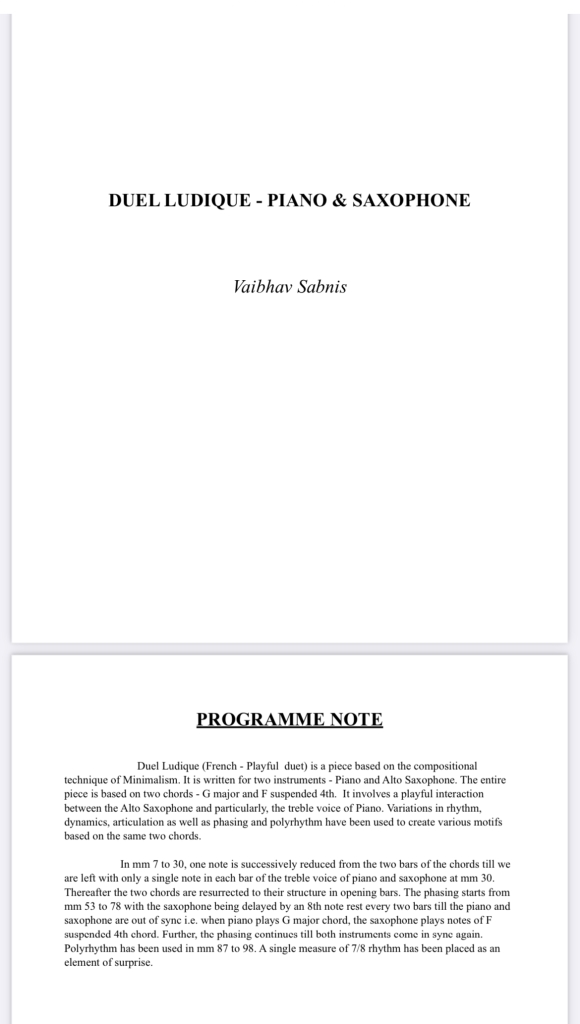
Sometime around mid-April, Smith convened a meeting will our entire batch between two lectures. Everyone was curious as there had never been a meeting before, let alone at such short notice. It turned out to be a meeting for the preponement of our exams as they wanted to conduct the KM day earlier. Initially, KM day was scheduled on 20th of May and exams in the first week of May. But for some reason, they wanted to prepone KM day to 3rd May and therefore, wanted to conduct exams in the last week of May. There was panic and an uproar in the class. But Smith reasoned that performance in front of the Principal, arguably one of the greatest music composers in India, was a much sterner test than KM exams. Wouldn’t it be better to give your best performance on KM day without the additional stress of exams? Gradually, we calmed down and accepted the situation.
It seemed Smith was right. Exams came and went. We did what was needed of us and got it over with. A lot of the students were worried about the theory papers. But I was worried about the performance. A Western classical and Hindustani classical performance, each for roughly 10 minutes was no joke. Believe me, performing any kind of classical music is not easy unless you have considerable experience. Eventually, I passed with distinction, and convocation in the presence of my wife was indeed a very special moment.
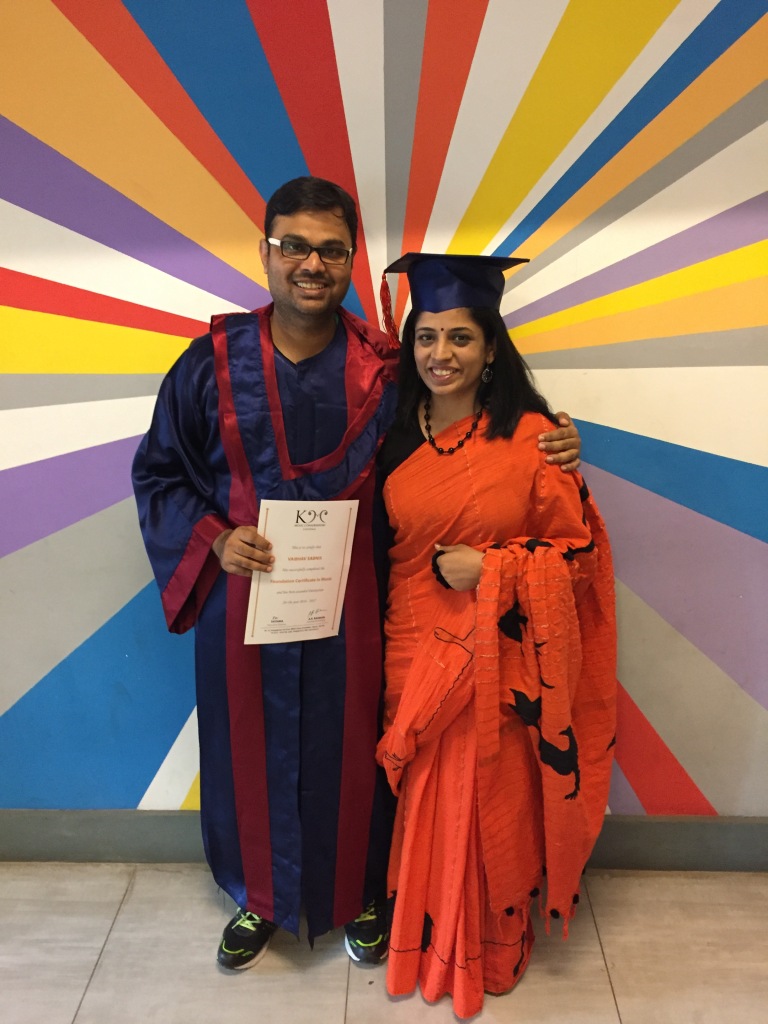
The opera was one of the main attractions of KM day as the purpose behind starting KM Music Conservatory, according to AR Rahman was to have a string orchestra of his own and train Indian students in Western Classical Music. What better testimonial than to have an opera in (part) German performed by the students of KM?
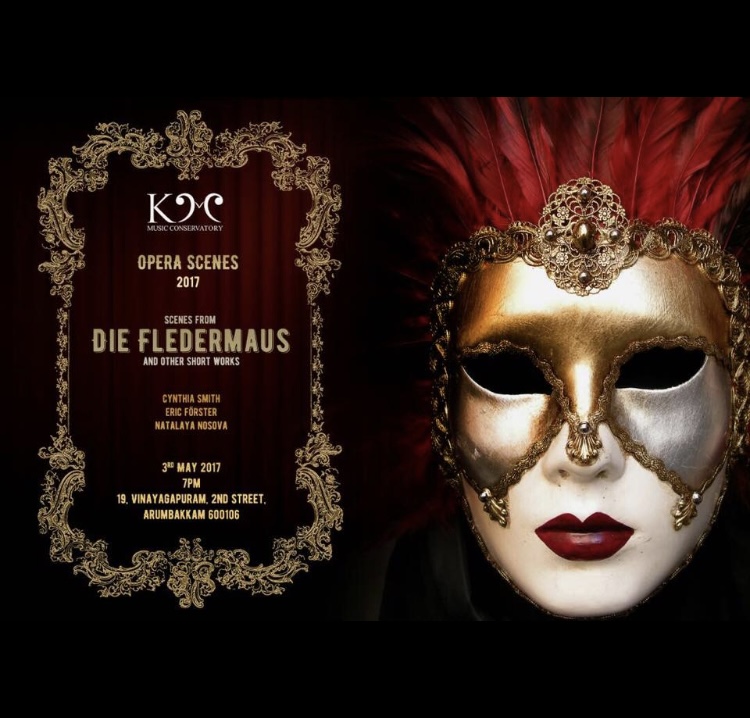
The KM faculty put out all the stops for the Opera scenes. A fortnight ago, they had called a tailor to take measurements and stitch costumes for each of us which came for trial a few days before KM Day. The dazzling, colourful party gowns and impeccable suits stacked in the lecture hall created a lot of excitement.
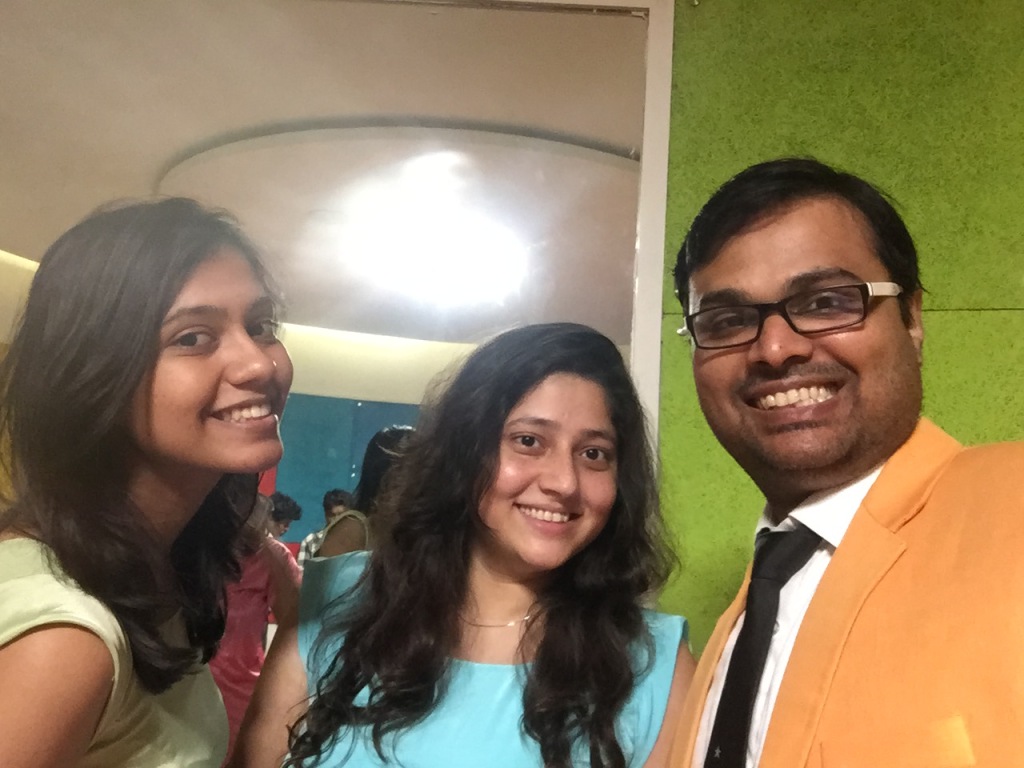
The opera was a grand spectacle with blazing lights, a live orchestra, smooth, resonant vocals supplemented by a sonorous chorus, some acting and a bit of dancing too. The orchestra was replete with violins, oboe, drum set, piano and miscellaneous percussion instruments. Our faculty played most of the instruments and John was conducting the orchestra. It seemed they had practised religiously and the only thing remaining was co-ordinating with the singers. And that turned out to be the most difficult part. Towards the end of the practice sessions, I had memorized every single piece of music in the opera. But my part in the first act was particularly challenging as I had to count the beats and start at a precise beat. I had erred multiple times during practice and at one point, John had been so frustrated with me that he had felt like tearing his hair. Fortunately, he didn’t have any!
In the final performance, I was in perfect sync with the orchestra. It seemed that all my learnings in Western Classical Music culminated in that half-hour of musical extravaganza. In the trio, both Kavya and Jaganjot were singing in a high pitch and I felt my voice was completely drowned. So after the opera, I asked Viktoriya whether I was audible or not. She assured me that I was audible and performed well. You see, be it Indian or Western music, there is a lot of subjectivity involved in music and art, in general. Therefore, one has to put their faith in their teacher or Guru and follow the path led by them.
The opera performance was indeed one of the high points of my stint at KM and a once-in-a-lifetime experience.
Epilogue
The one thing that you all must be curious about is: If the music school was indeed so awesome, why didn’t I continue after the foundation course? Honestly, I ask myself the same question from time to time. There were several factors. Firstly, my health suffered during this year and I had to undergo a surgery. The post-op recovery took almost a month. Secondly, I was not in a sound state, financially. My savings had dwindled as I had been doing only a part-time job. I had been hoping to apply for the scholarship but that would not have worked out. The scholarship was not based solely on grades but on other factors like financial condition, parents’ salary etc. Eventually, I learned the scholarship money had been distributed equally among 4 students, each receiving 1.5 lakhs, which was less than a month’s salary for me as a radiologist. Although the fees for the first year of diploma were quite high (another six lakhs), what pinched me more was giving up the radiologist salary which I had gotten accustomed to. Meanwhile, my wife had cleared the UPSC exams with flying colours and would be joining the Indian Administrative Services. We had already spent a year apart. She was supposed to join her academy in Mussoorie for training. Taking a trip from Chennai to Pondicherry was easy and could be done as frequently as every weekend. But visiting her in Mussoorie from Chennai was highly inconvenient. Therefore, I decided to take up a job in Mumbai near my home. At least I would stay with my family.
All these factors were important, no doubt. But it can still be worked out if your mind’s made up. At that stage, I just wasn’t prepared to take the leap of faith. Simple as that. Eventually, after leaving KM, I found myself in Pune where I started learning Hindustani Classical Music from another teacher. He concentrated on the basics, and during the next year, he would only ask me to sing ‘Sa re ga ma…’ That was when I realized that when it comes to music, sometimes, a lot can seem quite less, while less can be almost infinite. In 2019, I did a concert with a couple of friends from KM at a medical conference in Kochi. I got the gig through my boss and mentor in Apollo Hospital, Chennai. We performed for a small audience of around fifty people. They just could not have enough of us and it was exhilarating. It motivated me to start writing and composing songs. That was when I realized, ‘Dear Music, you and me, we still have some unfinished business.’
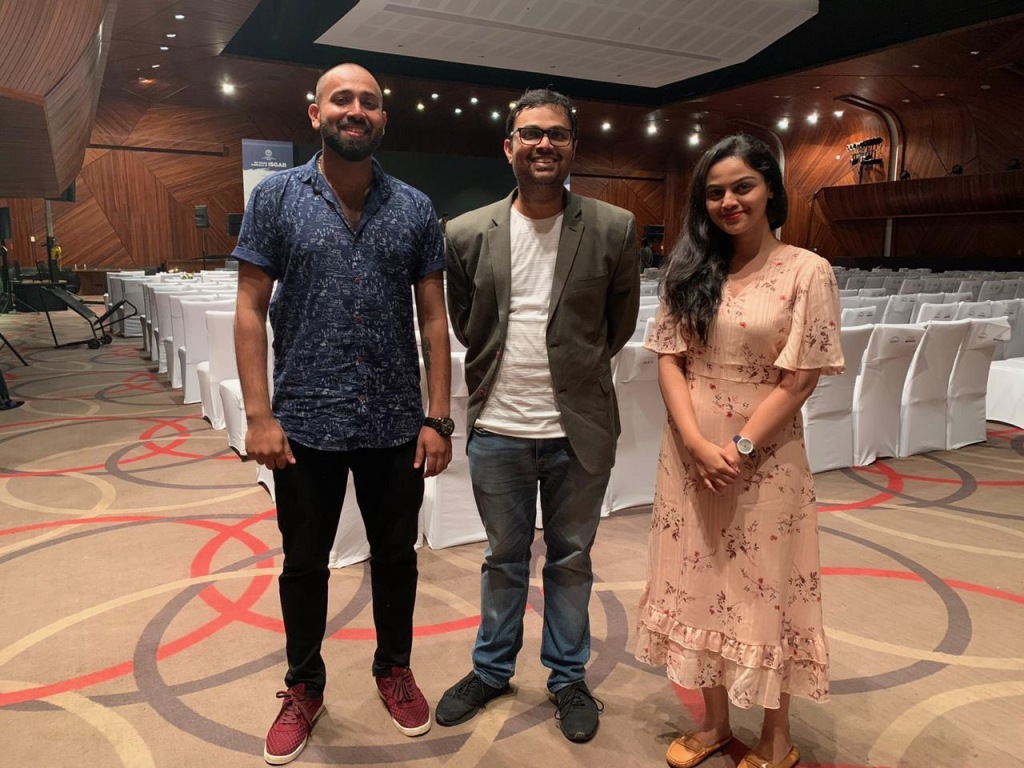
Leave a comment